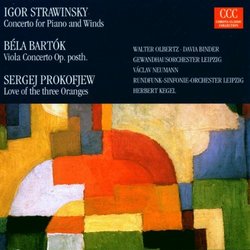| All Artists: Bela Bartok, Sergey Prokofiev, Igor Stravinsky, Herbert Kegel, Václav Neumann, Gewandhausorchester Leipzig, Leipzig Radio Symphony Orchestra, Walter Olbertz Title: Stravinsky: Concerto for piano & winds; Bartok: Viola Concerto; Prokofiev: The Love for Three Oranges Members Wishing: 0 Total Copies: 0 Label: Berlin Classics Release Date: 10/1/2005 Genre: Classical Styles: Forms & Genres, Concertos, Instruments, Keyboard, Strings, Symphonies Number of Discs: 1 SwapaCD Credits: 1 UPC: 782124014322 |
Search - Bela Bartok, Sergey Prokofiev, Igor Stravinsky :: Stravinsky: Concerto for piano & winds; Bartok: Viola Concerto; Prokofiev: The Love for Three Oranges
 | Bela Bartok, Sergey Prokofiev, Igor Stravinsky Stravinsky: Concerto for piano & winds; Bartok: Viola Concerto; Prokofiev: The Love for Three Oranges Genre: Classical |
Larger Image |
CD Details |
CD ReviewsGood for the Prokofiev Ralphus | Goyang, Gynggi-Do Korea (South) | 05/07/2008 (3 out of 5 stars) "I bought this unheralded Edel Classics disc primarily for the Prokofiev "Love for Three Oranges Suite" but also because it contained two works by Stravinsky and Bartok that I was unfamiliar with.
With regard to the Prokofiev, I am quite satisfied. The performance is lively and polished and, despite being from 1963, is sonically good. Bartok's Viola Concerto is known for being not-quite-Bartok (completed by Tibor Serly) and seems to be fairly unloved. I suppose I can hear why, but this recording probably isn't an ideal way to get to know it. The second and third movements coalesce fairly well but the first seems under-rehearsed on the part of the orchestra (Leipzig Radio Symphony under Herbert Kegel, as with the Prokofiev) and I don't particularly enjoy soloist Davia Binder's tone in this movement (quite violin-like, though I'm not sure if this is felt to be idiomatic for this piece or if the problem lies with Bartok/Serly). Sonically this recording (from 1967) isn't as good as the Prokofiev either. The biggest problem with this disc is Stravinsky's Concerto for Piano and Winds. Here the orchestra is the more famous Leipzig Gewandhaus conducted by Vaclav Neumann, with soloist Walter Olbertz. The orchestra sounds VERY under-rehearsed with some shaky playing and intonation problems. Balance between various sections is very poor but I'm not sure if the horrible recorded sound is partly to blame for this. Olbertz hammers the piano in a presumably appropriate percussive manner, but again the sound quality makes it impossible to fairly judge his performance. This recording is from 1966. So, for the Prokofiev, this is a worthwhile disc: 4 or 5 stars (there are probably better performances out there--Dorati's seems highly praised--but to my ears it 'felt like Prokofiev'); for the Bartok, less so: a generous 3 stars (but as I'm not familiar with the work, I'm probably not the one to judge); for the Stravinsky, it's a disaster: 1 star (I'm not familiar with this piece either, but the horrendous sound and (im)balance of the orchestra means that after listening to this I still have no real idea of the music). I should also add that there are no booklet notes whatsoever (just a fold-out ad for other releases) which is a shame as I would have loved to learn something about the Stravinsky, the history of the Bartok completion, and something about the provenance of these recordings. If the attractive programming (lesser-known works by great composers that, if you're like me, may fill some gaps in your collection) and perhaps the presence of two well-known, if not necessarily highly vaunted, conductors piques your interest, be aware that this CD will not entirely satisfy. TT = 57'56" (ADD/Stereo)" |
